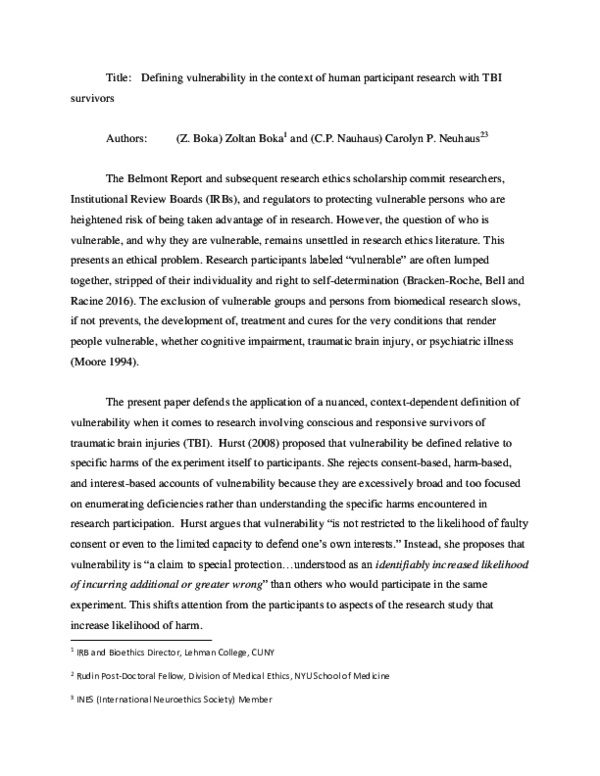Academia.edu no longer supports Internet Explorer.
To browse Academia.edu and the wider internet faster and more securely, please take a few seconds to upgrade your browser.
Title: Defining vulnerability in the context of human participant research with TBI survivors
Title: Defining vulnerability in the context of human participant research with TBI survivors
Related Papers
Nature Reviews Neuroscience
Science and society: Constructing an ethical stereotaxy for severe brain injury: balancing risks, benefits and access2003 •
The Journal of Rehabilitation Research and Development
Unresolved legal and ethical issues in research of adults with severe traumatic brain injury: Analysis of an ongoing protocol2004 •
Acta Neurochirurgica
Ethical considerations on consent procedures for emergency research in severe and moderate traumatic brain injury2005 •
The Qualitative Report
From Test to Testimony: Resiliency After a TBI Diagnosis2019 •
Autoethnographic research is a relatively new means of gathering data on oneself to connect to research and theory while advocating for change within a policy, law, and/ or environment. In this autoethnography I will recount the experience of my traumatic brain injury (TBI) diagnosis following a car accident and present a few implications for the professionals and members of the society at large surrounding the issue of TBI such as the need for awareness and understanding as well as the importance of therapy and other forms of care within different cultures. When I was first diagnosed, many people did not know what TBI was, what it stood for, or what symptoms could result. Although research has progressed with this diagnosis, there is still a long road ahead. The first step to change is recognizing that there is a problem. After the problem is recognized, the solution can begin.
Archives of Physical Medicine and Rehabilitation
Systematic bias in traumatic brain injury outcome studies because of loss to follow-up2003 •
Archives of Physical Medicine and Rehabilitation
Systematic bias in outcome studies of persons with traumatic brain injury1997 •
2005 •
Summary Therapeutic trials in TBI are subject to principles of Good Clinical Practice (GCP), to national legislation, and to international and European ethical concepts and regulations [e.g. 13]. The guiding principles underlying these investigations of treatment are respect for autonomy of research subjects, protection against discomfort, risk, harm and exploitation and the prospect of some benefit. Patients with significant TBI are mentally incapacitated, thus prohibiting obtaining consent directly from the subject. Various approaches to consent procedures are used as surrogate to subject consent: proxy consent, consent by an independent physician and waiver of consent. These approaches are reviewed. A questionnaire soliciting opinions was mailed to 148 EBIC (European Brain Injury Consortium) associated neuro-trauma centers in 19 European countries. 48% respondents believe that relatives were not able to make a balanced decision, 72% believed that consent procedures are a signific...
Scholarly inquiry for nursing practice
A New Perspective: A Vulnerable Population Framework to Guide Research and Practice for Persons With Traumatic Brain Injury2006 •
2019 •
RELATED PAPERS
International Journal of Humanities and Social Science
An Evaluation of the Effect of Financial Literacy Education on Financial Literacy among College Students2018 •
Remittances Review
Addressing the Educational Needs of Students with Visual Impairment in Inclusive Classrooms: Challenges Faced by Teachers2024 •
2024 •
Revista Española de Cardiología (English Edition)
Pseudoaneurysm of the Pulmonary Autograft Following the Ross Procedure2007 •
Scientific Reports
Three-dimensional non-destructive visualization of teeth enamel microcracks using X-ray micro-computed tomography2021 •
Journal of Water, Sanitation and Hygiene for Development
A socio-ecological perspective of the facilitators and barriers to uptake of water, sanitation and hygiene interventions in a slum setting in Kampala, Uganda: a qualitative study2020 •
Construction and Building Materials
Optimal use of flocculants on the manufacture of fibre cement materials by the Hatschek process2010 •
International Journal of Pharmaceutical Sciences and Medicine (IJPSM)
Acute Toxicity Test of Standardized Ethanol Extract of Gandasuli Rhizome (Hedycium coronarium) and Histopathology of Organs in White Mice Male (Mus muculus)2022 •
Journal of Asian Earth Sciences
This special issue honors the distinguished economic geologist, Professor Yuchuan Chen on the occasion of his 80th birthday (2014)2015 •
Hearing Research
Evoked otoacoustic emissions and auditory selective attention1996 •
King Prajadhipok’s Institute Journal, 21(3), 102–128.
They said we were brain washed: How Thai students learn democratic values under the limited socialization of democratic values. The case study of Thai student mob in 2020. (Full text in Thai version)2023 •
RELATED TOPICS
- Find new research papers in:
- Physics
- Chemistry
- Biology
- Health Sciences
- Ecology
- Earth Sciences
- Cognitive Science
- Mathematics
- Computer Science

 Zoltan Boka
Zoltan Boka